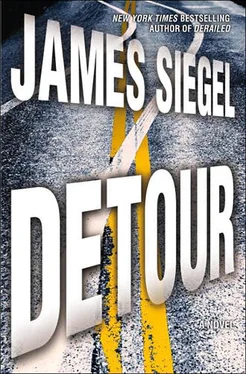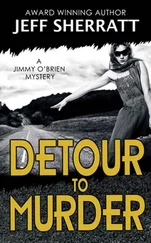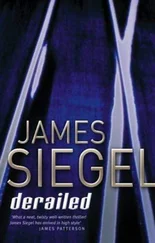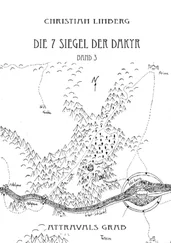That smell.
Kerosene.
Okay, Paul finally understood. He got it. Much as he didn’t want to, much as he wanted to remain dumb and clueless. They were laying down a line of kerosene. They were making this line behind them, behind the wind itself, which was blowing away from them. Paul pictured it—a solid wall of flame. And he pictured something else—that house in Jersey City. What used to be a house in Jersey City. The place he was supposed to meet the two guys in the blue Mercedes, Polo and Izod. Only he hadn’t met them, because someone had burned down the house—reduced it to a dark primeval hole.
Who?
The same guys who were circling them with kerosene in their hands. That was the logical conclusion—what the empirical evidence would lead you to.
Paul had twice tried to deliver the drugs, and twice he’d been stopped by the same band of arsonists.
Paul turned to Miles once again to ask him something, but the question flew out of his head at the sight of Miles edging backward on elbows and knees. He looked . . . odd. Like a white person trying to dance black. Like he was doing the worm. He was doing it double-time; moving at the speed of panic.
Paul saw why.
The odds of dying from smoke or fire are 1 in 13,561.
The first flame had shot up into the air about fifty yards behind and to their right. It looked biblical—like a solid pillar of fire. The line of cattails would light up like briquettes soaked in lighter fluid, then be spurred forward by the wind. If they ran from the fire, they would only wind up facing another kind of fire, the kind produced by semiautomatic weapons. Miles, who’d been known to bet on a baseball game or two, was betting that he could go the other way—that he could go toward it. That he could make it out before the entire line lit. That he could race the fire and win.
By the time Paul caught up to him, Miles had turned himself around. They shimmied through the weeds on their bellies just a few feet apart from each other, noses inches above the pungent stink of the swamp, an odor still preferable to its alternative.
Burned flesh, Paul couldn’t help noticing, smelled sickly sweet.
The men had miscalculated—tried to get someone to run who was very possibly past running. The bullet in his neck, Paul thought. The man in the Polo shirt was dead.
They kept crawling.
Picture those half-fish creatures in the Pleistocene era, slithering out of the water onto dry land on their way to a better future. If they’d only known what awaited them, Paul thought, they might’ve turned around and gone back.
He felt only half human now. Covered in slime and mud, bleeding from the razor-sharp weeds and furiously biting insects. Breathing was next to impossible—sinewy lines of choking black smoke were already snaking across the ground.
He was traveling blind. His eyes were dripping—half from the smoke and half from the awful knowledge that he’d failed.
He could sense the fire to their left. How far away? Twenty yards? Close enough to feel the heat like a wave—the kind that tumbles you into the surf and just won’t let you go. Faint blisters were rising up on his forearms.
Faster. Faster. Faster.
What were the odds they’d make it now? The actuary in him said: Nil. Zippo. Nada.
Give up.
He couldn’t. Self-preservation vanquished self-pity. If his wife and child were going to make it out of Colombia, he had to make it out of the swamp.
Paul could see the first jagged slivers of fire flickering through the stalks. The cattails were crackling, snapping, literally disintegrating in front of his half-blinded eyes. It felt as if every bit of air were being sucked out of there. The men were screaming over the fire’s deafening roar like college students before a pregame bonfire.
Miles collapsed to his right.
He lay there on his belly, wheezing, desperately trying to gulp in air.
“Come on, Miles. A little further.” It took an enormous effort for Paul to get the words out of his mouth. They tumbled out half formed and garbled, as if he were speaking in tongues. They had zero effect. Miles lay there, unmoved and unmoving.
The fire was making a beeline for them. It was almost there.
“I . . . can’t . . . ,” Miles whispered between gasps. “I . . .”
Paul grabbed his shirt collar—hot and steaming, like laundry fresh from the dryer.
He pulled.
It made no sense. It was merely symbolic, since he didn’t have the strength to pull Miles from the fire, any more than he had the strength to stand up and take on the murderers who’d started it.
He pulled anyway.
Suddenly, Miles seemed to gather what little energy he had left. He moved. Just a foot or so. Then another foot. And after coughing up some black phlegm, a foot more.
It was too late.
They were in the mouth of the furnace. It was yawning open for them. They weren’t going to make it.
Though I walk through the valley of the shadow of death, my . . . My rod and my . . . My rod . . . Where were the words when you really needed them? He was down to crawling on bloodied hands and knees. He was doing what any atheist does in foxholes. He was mumbling the magic words he’d abandoned as a sad and lonely little kid.
Miles was there beside him. The fire lit him up like someone in a flash-frame.
Paul’s flesh began to sear—to literally burn off. He took one last lunge, then covered up his face, hoping it wouldn’t hurt.
That was all.
TWENTY-FOUR
Nothing had been said to her. But she knew just the same.
Galina might’ve told her it was going to be all right, but it wasn’t all right.
It was monotonous and deadening and endless.
Every moment, at least, that she wasn’t holding Joelle in her arms. Those moments, by contrast, were achingly life-affirming.
She got to experience those moments only twice a day—for morning and evening feedings. Galina would bring her to another room in the farm—she was fairly sure it was a farm, since she could hear roosters and chickens and the bleating of cows and sheep. She could smell them too—mixed in with the unmistakable odor of freshly turned manure. She’d been born in Minnesota, farm country, and her olfactory senses had been honed on those earthy smells.
When she asked Galina what happened—whether Paul had delivered the drugs like he was supposed to—she shrugged and didn’t answer.
No answer was necessary. He had or he hadn’t, but Joanna knew that she needn’t be packing her bags anytime soon.
It was the routine that saved her—those morning and evening feedings, waited for with a tingling anticipation. It was routine that was murdering her too, bit by bit. The sameness, the torpor, the sense of unyielding and unbroken siege.
Her emotions, raised to the sky by Galina’s whispered assertion, were all dressed up with nowhere to go.
She was losing weight too—she’d become familiar with certain bones in her arms and rib cage she hadn’t known were there.
One night she heard a furious slapping from somewhere in the house. Followed by someone moaning—a man.
She sensed Beatriz and Maruja awake and listening next to her on the mattress.
“Who’s that?” she whispered.
“Rolando,” Maruja whispered back.
“Rolando,” Joanna echoed the name. “Who’s he? Another prisoner?”
“Another journalist who’s become the story,” Maruja said.
“Like you?”
“No. Not like me. Bigger. His son . . .” And her voice trailed off as if she’d fallen back asleep.
“His son. What about his son?”
“Nothing. Go to sleep.”
Читать дальше












